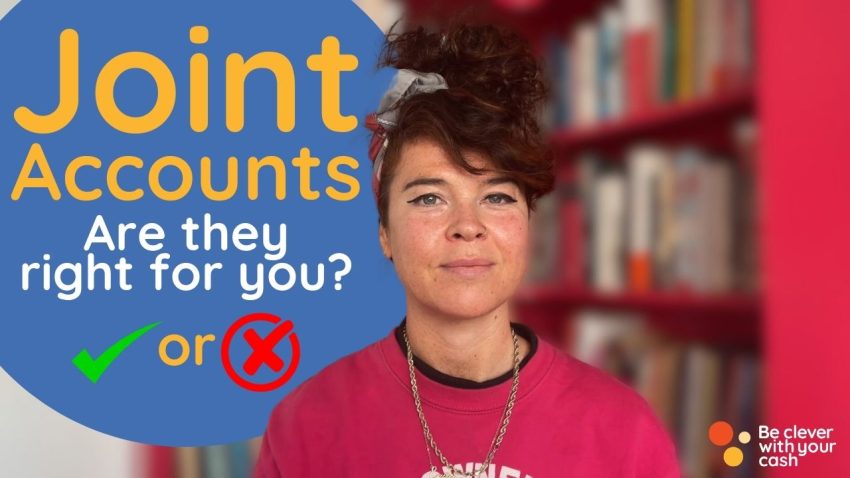We’ve uncovered what people really think about joint accounts
For years, many couples have opted for a joint account as a way to manage their finances. And a joint account can make it easier especially when you have shared expenses.
However, our exclusive research has revealed a shift in attitudes towards the joint account and revealed some concerning consequences of opening one.
Here’s what we found out.

Some articles on the site contain affiliate links, which provide a small commission to help fund our work. However, they won’t affect the price you pay or our editorial independence. Read more here.
Most people don’t want a joint account
Our research shows that the majority of people (56%) wouldn’t consider getting a joint account with anyone.
The main reason given was that they’d feel less control of their finances (51%) while almost one in three (30%) said a joint account would feel like an invasion of privacy.
Over one in four (26%) said they want to keep their income and savings a secret, while a similar number (25%) said they believe romance and money should be kept separate.
So there’ve been a variety of reasons given but essentially joint accounts are a no-go for these people because they don’t want another person having access to their money. Which is fair enough.
Bad experiences of joint accounts
Of those who told us they had a negative experience with a joint account, 53% said the person they shared the account with was ‘erratic’ with their spending.
This is one of the biggest risks with joint accounts – that whoever’s named on it can spend whatever money’s in it, no questions asked.
Some 41% said having a joint account caused arguments while a third (33%) told us they found it difficult to close the account when the relationship ended. This is another challenge with joint accounts – you both need to agree to close it, which can be tricky if a relationship ends badly or you lose touch with the other person.
Women are more likely to have had a bad experience using joint accounts than men. Nearly two thirds (64%) of women said the person they shared the account with was irresponsible with their spending, compared to two fifths (38%) of men.
And two in five (40%) women also said having a joint account didn’t make their finances more efficient, compared to just 18% of men.
We had some specific responses to this question too. One respondent said: ‘My partner took all the money out when she left me’, which is a risk that comes with joint accounts, as I’ve mentioned above.
Another said: ‘I had my own money account but worried about illness so added my husband on to my account but it backfired.’ Joint accounts can be useful if you struggle with health issues as the other account holder can pay for things from the account, but it sounds like this went wrong for this person.
And another user told us: ‘After I left my wife, she could see what I was spending money on’ which suggests the account wasn’t closed after the relationship ended, which is a good idea to do.
Get the best of our money saving content every week, straight to your inbox
Plus, new Quidco customers get a high paying £18 welcome offer

And the good experiences
But it’s not all bad. In fact, 69% of people who’ve had a joint account said it was a very or somewhat positive experience.
Of these people, 57% said it simplified sharing bills while 56% said it made budgeting together easier. Meanwhile almost half (46%) said it helped with saving towards joint goals and the same number said it increased trust in their relationship.
Some respondents told us that a joint account helped them manage their parents finances on their behalf. One person said a joint account was important because one of their parents is disabled while another said it was helpful to have one with their elderly mother.
Who’s more likely to get a joint account?
You can open a joint account with a spouse, partner, friend, housemate, sibling or whoever you want to share your finances with. You don’t have to be married, related or even share an address. However, for those planning to open one, it’s most likely to be with a romantic partner (46%), parent/guardian (26%) or sibling (23%).
Another interesting insight from the research, is that younger people are a lot more interested in opening a joint account in the future, compared to older generations.
Some 82% of 18 to 24 year olds would consider getting a joint account in the future, compared to just a quarter (26%) of people aged 55 – 64.
This could be because the younger group may have had less experience with financial products or haven’t explored the potential risks of linking their finances with someone else.
A common misconception that’s come up when I’ve spoken to young people is that you have to, or should, get a joint account when you move in with your partner – it’s just something you do when you cohabit with someone.
This isn’t the case and there are plenty of alternative ways to manage your finances, even if you’re splitting bills and other costs, without a joint account. And if you’re reading this and you’re not quite sure of what could go wrong, I’ve written about the pros and cons of joint accounts and whether they’re right for you.
 Featured switching deal
Featured switching deal
 Customer rating
3.8/5
Customer rating
3.8/5
- Switch bonus£200
- Offer endsUnknown
- FSCS Protected? Yes
- Bonus requirements Switch using the Current Account Switch Service and close your old account within 60 days of starting the switch
- Deposit requirements Deposit £1,500 in the first 60 days from opening the account
- Direct debits transferred over Set up two Direct Debits before or after the switch from a selected list of household bills
- Existing customers? Can't have held any Santander current account on 1 January 2025
- Restrictions Can't have received a switching bonus from Santander already, offer limited to once per person
- Eligible accounts Open a new or hold an existing Everyday, Edge, Edge Up or Edge Explorer current account

Amelia’s analysis
Joint accounts aren’t for everyone as we can see from this research – in fact, I’m surprised by how many people would never consider opening one. Relationships have changed massively in recent generations, we’re settling down later in life and many of us will have gotten used to being financially independent. It may be that it makes it more difficult to join up your finances with someone else when you’ve been doing alright on your own for so long.
And that’s totally fine. Just because you get into a relationship doesn’t mean you have to get a joint account. However, it can make some things easier such as paying shared bills and expenses, say if you’ve got a car or a dog, and saving towards your goals you’ve set as a couple.
Yes, there are risks that the other person could drain the account or spend irresponsibly – which will impact your credit history – but you can take steps to mitigate these risks.
I have a joint account with my boyfriend and we only use it for our shared spending – household bills, mortgage payments and food. We get our salaries paid into our own individual accounts but we transfer a set amount into our joint account each month which covers our shared outgoings.
Most of the big bills come out near the start of the month, so there’s not much for my boyfriend to steal if he ever goes rogue, and I’ve very much kept my financial independence by keeping hold of my own accounts.
While having a joint account does make some things easier, you do need to trust the person you’re opening up an account with. And it’s really worrying to hear how women are more likely to have had a bad experience with joint accounts. So don’t rush into it. There are plenty of ways to manage your money as a couple, including just transferring it to each other, until you feel ready.





